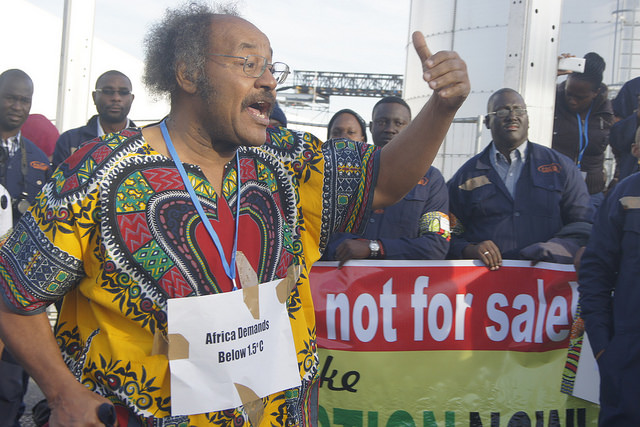
By Kofi Adu Domfeh
President Trump’s Executive Order on Climate Change will have far reaching impacts on many developing countries, especially in Africa, where millions are already bearing the brunt of the negative impacts of climate change.
African Civil Society, under the umbrella of the Pan African Climate Justice Alliance (PACJA), says reversing the Obama climate plan is one of the greatest injustices and an onslaught on Mother Earth, especially in the fight against climate change.
The Energy Independence Executive Order, signed by US President, Donald Trump on March 29, 2017, has been hailed by groups in the fossil fuels business, but condemned by environmental campaigners as over a dozen measures enacted by President Obama to curb climate change have been suspended.
“Trump’s Climate Change Executive Order is rolling back the many years of global efforts that yielded the Convention and the Paris Agreement. The global community and other world leaders should resist the temptation of following the footstep of Trump to take the world several steps back in the fight against climate change,” said Mithika Mwenda, PACJA Secretary-General.
For a safer world, countries that are party to the United Nations Framework Convention on Climate Change (UNFCCC) and the Paris Agreement will urgently need to raise their ambition to increase the level of their greenhouse emission reduction targets communicated to the UNFCCC and keeping the global temperature to below 1.5OC.
The current aggregate level of the communicated Nationally Determined Contributions (NDCs) are estimated to lead to the average global temperature increase above 30C by 2030, unless radical emissions reduction targets are urgently adopted by Parties.
The NDC of the United State of America submitted to the UNFCCC on March 31, 2015 commits USA to cutting its greenhouse gas emissions by 26%–28% below the 2005 level by 2025.
The US effort constitutes a part to the global comity of nations’ efforts to keep the planet safe.
“As one of the major contributors to the greenhouse gas emissions, the US continues to owe a huge ecological debt that can only be paid by the demonstration that it is committed to servicing this climate debt in an equitable, fair and just manner. Such efforts should align with the principle of Common But Differentiated Responsibility and Respective Capacity (CBDRC) of the Convention,” said a statement from PACJA.
African Civil Society is worried efforts to improve people’s vulnerability to climate change are being eroded by Trump’s Executive Order.
Currently, impacts of drought and famine in the Horn of Africa have led to deaths of humans and livestock in the region. Farmers in most parts of the Africa are feeling impacts of the changing climate in their agricultural production and productivity.
According to Sam Ogallah, Programme’s Manager at PACJA, Trump’s action on climate change is likely to exacerbate the current migrant crisis.
“Climate change impacts are pushing many youth out of developing countries in search of better lives in developed countries. Some of these youth in an attempt to migrate to Europe have lost their lives. Addressing climate change in developing countries can go a long way to solving migrant crisis in Europe and other developed countries,” he said.












